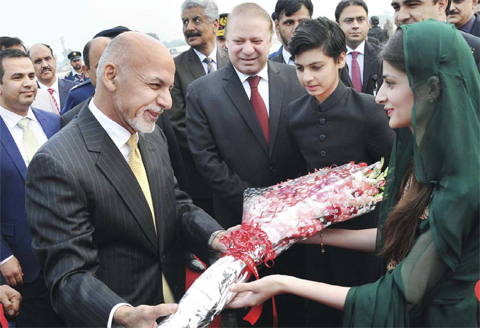 RAWALPINDI: Afghan President Ashraf Ghani (left) receives bouquet from a Pakistani woman as Prime Minister Nawaz Sharif (center) looks on upon his arrival at the military Nur Khan airbase. — AFP photos
RAWALPINDI: Afghan President Ashraf Ghani (left) receives bouquet from a Pakistani woman as Prime Minister Nawaz Sharif (center) looks on upon his arrival at the military Nur Khan airbase. — AFP photosISLAMABAD: Afghan president Ashraf Ghani arrived in Islamabad yesterday hoping to revive peace talks with the resurgent Taleban, as he opened a regional conference that has taken on added significance with the attendance of India's top diplomat. Pakistan's Prime Minister Nawaz Sharif personally welcomed Ghani at the airport in a red-carpet reception with a guard of honor and 21 gun salute, with the leaders scheduled to hold bilateral talks later in the day.
Relations between Afghanistan and Pakistan had plummeted since July following confirmation that the Taleban's founder Mullah Omar was dead, a revelation that scuppered nascent peace talks between Kabul and the Islamist movement. Ghani subsequently blamed Pakistan for a surge in Taleban attacks inside Afghanistan, accusing Islamabad of sending "messages of war".
Yesterday, both leaders vowed to fight militancy and extremism in the region after they jointly opened a regional conference in Islamabad. Their meeting is seen as a strong signal that both sides are attempting to revive the Taleban talks, brokered by Pakistan's powerful army which has long wielded influence over the insurgent group.
"I strongly reiterate our commitment to a lasting and just peace within which all movements that resort to arms convert themselves to political parties and participate in the political process legitimately," urged Ghani in his speech.
But Ghani added that Pakistan's military operations in its restive northwest had the "unintended consequences" of causing militant groups to spill over into Afghanistan. "Terrorism and extremism is the common enemy of all, we need a collective approach to combat this menace," said Sharif, before highlighting the growing threat the Islamic State group poses to both countries. "The enemies of Afghanistan are the enemies of Pakistan," he added.
Mending ties
India's foreign minister Sushma Swaraj, whose arrival in Pakistan marked the highest-level visit from New Delhi since 2012 and is seen by observers as a sign of improving ties between the two countries, said she had come "with a message for better relations".
"It is important and we want to take the relations further-I will only be able to tell you more when I am leaving," she told reporters after arriving at the airport Tuesday.
Tensions between nuclear-armed India and Pakistan have spiked over the past two years, with cross-border shelling over their disputed border in Kashmir claiming dozens of lives since 2014. But a brief meeting between Sharif and his counterpart Narendra Modi on the sidelines of the UN Climate Change Conference in Paris on November 30 appeared to have broken the ice.
While talks between India and Pakistan are likely to focus on Kashmir and security issues, observers are also watching keenly for an announcement on whether or not the first cricket series between the two countries in three years will go ahead. The Heart of Asia - Istanbul Process was established in 2011 as an initiative by Afghanistan and Turkey to foster regional cooperation and long-term peace in Afghanistan. - AFP










